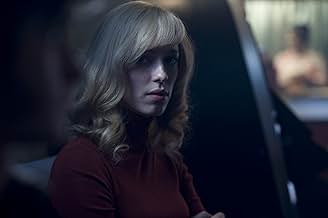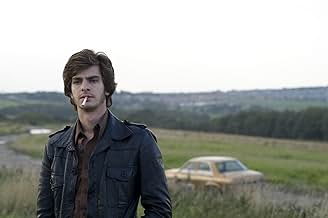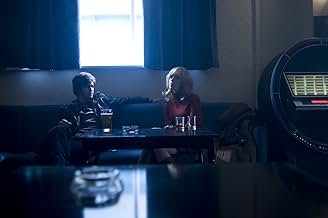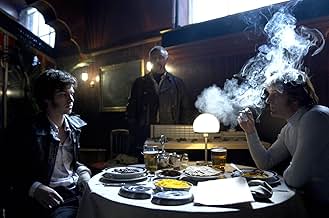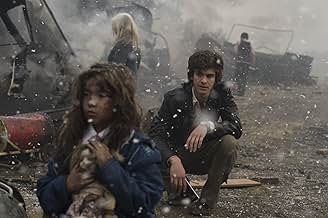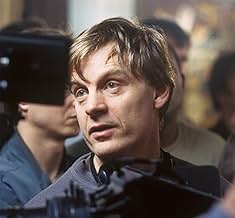The Red Riding Trilogy: 1974
- TV Movie
- 2009
- Tous publics avec avertissement
- 1h 42m
Rookie journalist Eddie Dunford is determined to find the truth in an increasingly complex maze of lies and deceit surrounding the police investigation into a series of child abductions.Rookie journalist Eddie Dunford is determined to find the truth in an increasingly complex maze of lies and deceit surrounding the police investigation into a series of child abductions.Rookie journalist Eddie Dunford is determined to find the truth in an increasingly complex maze of lies and deceit surrounding the police investigation into a series of child abductions.
- Won 3 BAFTA Awards
- 5 wins & 10 nominations total
- Steph
- (as Katharine Vasey)
- Director
- Writers
- All cast & crew
- Production, box office & more at IMDbPro
Featured reviews
Without spoilers: this movie has a grim atmosphere about conspiracy and corruption among people in a position of power. Andrew Garfield plays a reporter who tries to uncover some of the awefulness, but he has his own demons, which the movie leaves unexplored almost entirely. Why bring that up then? Same goes for some "love" scenes, which seemed forced/irrelevant to the plot, or at the very least redundant. Another let down was that everybody "bad" had zero redeeming qualities, making them kind of caricaturistic.
I think the movie was successful in creating a captivating vibe, but it had quite a few plotholes/unanswered questions which together with the chaotic disquisition failed to bring it to a good enough movie to want to recommend it to others unless they have nothing better to watch.
He's been in the South, you see. American viewers with a limited perception of the UK may, at the beginning of Channel Four's remarkable Red Riding trilogy, have little understanding of what difference that makes. They will soon learn. "This is the North," says one of the terrifying policemen who populate this film's haunted Yorkshire. "Where we do what we want."
Red Riding: In the Year of Our Lord 1974 begins under lowering skies. A girl of ten has vanished. A young and callow crime reporter Eddie Dunford (Andrew Garfield) gets clued in by a conspiracy-minded colleague that the vanishing resembles two previous cases within a close range. Eager to make his mark, he senses opportunity, and in excitement at the idea that a serial murderer might be at work he blurts, "Let's keep our fingers crossed."
As the story deepens, however, so does the character. The grief of the victims' families needles him; he begins a relationship with one girl's heartsick mother (Rebecca Hall). Picking apart the story that emerges, he is drawn into the orbit of a wealthy developer (Sean Bean) with an unwholesome degree of influence in Yorkshire and its power structure. The perpetrator of the crimes is unquestionably psychopathic -- he stitches "angels' wings" into his victims' backs. Yet, in the film's most disturbing element, the police department itself functions as a psychopath, achieving its desires through brutalization, torture, and even possibly murder.
Caught in a conscienceless land, Dunford's own conscience, in reaction, grows, and what began as mere ambition transforms into a perhaps doomed lust for the truth. If this sounds like a conventional trope of the genre, it is -- plotwise much of what happens here is conventional. But Red Riding makes the narrative fresh by treating it not just as a story of crime and justice but as one of the soul, and its environs. When Dunford begs the mother to escape with him from the prevailing madness, he tells her, "In the South the sun shines." What he's telling her is that the sickness is inseparable from the place. Yorkshire is filmed (with gorgeous gloom) as a cloud-shrouded ruin, an economic disaster site in which financial power trumps morality. Starting out fresh-faced, vain, and cocky, Dunford will, by the end of his journey, be considerably the worse for wear. Looking at the landscape around him, we think, how could he not be?
Red Riding 1974 is not flawless -- some scenes feel repetitive and the bleakness can be overwhelming. But it compels you forward, it stays with you, and it genuinely rattles the spirit. This is not easy viewing, but in approaching the continuing saga, it promises hard- earned reward.
When I watched this film I tried to put the hype and critical acclaim out of my mind and just come to it as I found it. As such I was not overly impressed by it but did enjoy it for the grimness that it does well. The film does have an engaging sense of foreboding and toughness that suits the material and it delivers this aspect of it very well in terms of tone, locations, costumes and general feel. However, this is ultimately a story, not just atmosphere, and I was surprised that the film didn't deliver on this particularly well. I've never read the books but I do presume they are longer than this 90 minute film represents and I presume this because it seems like a lot is rammed in here and nothing really has much time to develop or grow before we're onto the next thing. This reduced the impact of the story for me because it did feel like I was being rushed through it rather than being allowed to move around within it. It isn't helped by it more or less going where you think it will go almost by virtue of how quickly it hands you everything, thus focusing on mind on certain characters and scenarios rather than allowing the bigger world to be a thing.
The cast do well even though so many of them seem to have a few minutes each. Garfield is solid in the lead even if he seems to spent a lot of the time just being beaten. Hall works well next to him but outside of these two the cast seem too deep in faces and not deep enough in screen time for them. So people like Marsan, Mercer, Bean, Mullan etc really don't feel like they are well used even if they are good in their moments. Everyone has a good accent but it is worth saying that to those not familiar with it, it may be difficult to always pick up what is being said – this is not just down to the thickness of the accents but the sound engineering here has lots of background noise and, for the sake of atmosphere I guess, seems to have lots of mumbling.
This first film has enough good about it for me to check out the second in the trilogy, but I hope it does better with the actual story telling part. In this case atmosphere and time/place was very well done but the story and characters felt rushed and the impact of the tale was lessened due to this, which is a shame.
In 1974, the bright-young-thing Eddie Dunford (Garfield) is an ambitious crime reporter for The Yorkshire Post, who takes it on himself to probe three similar cases of missing or murdered teenage girls, which puts his own life on the line. He hits every nook and cranny of procedural clichés, from losing a dear colleague Barry Gannon (Flanagan). who knows too much of the dirty business (after being inauspiciously warned about his own safety) nevertheless withholds crucial information from Eddie, to the police's porous covering-up of the culprit with a scapegoat Michael Myshkin (Mays), until Eddie meets Paul Garland (Hall), who channels a shopworn ambiguity between a grieved damsel-in-distress and an inscrutable gangster's moll, whom he incurably falls in love with. Finally his path comes across with John Dawson (Bean), a local real estate magnate, and after succumbs to an excruciating reality check signed by both Dawson and police force, Eddie despondently realizes he cannot save nobody, a final vigilante bloodbath is his last gamble to right the wrong in the only option he is left with (again, manipulated). The movie is shot in subdued retro-sheen, Garfield fleshes out Eddie's fix with absorbing commitment, and Hall is magnificent to behold in her blond charisma.
'Nineteen Seventy-Four' has shades of 'Taxi Driver', the narrative framed not by the steam that rises from the streets of New York City but instead by the skies of Yorkshire. The comparison between the two movies really occurred to me most strongly at the end of the film and I think you'll see why.
The acting is spot on from everybody. I can't think of one performance that stands out for the wrong reasons. Andrew Garfield is excellent in the lead role and Sean Bean is on form.
The exploration of police corruption and the struggle for both revenge and justice resonate well beyond the ending of the film.
The cinematography is excellent and it is disappointing that films of this quality have to be shown on television because they won't find enough of an audience in the majority of British cinemas.
Did you know
- TriviaThe television trailers for all three Red Riding episodes bore the tagline "Based on True Events." Nevertheless, none of the characters, nor the murder victims, bear the names of real people and only a few have obvious real-life models.
- GoofsSean Bean's Jensen is plated 'P.' This denotes 1975 and 1976, not 1974, as new plates were issued every August. Andrew Garfield's Vauxhall Viva, registered in August 1974 with 'M' plates, would therefore have been brand new.
- Quotes
[first lines]
Eddie Dunford: Little girl goes missing, the pack salivates. If it bleeds it leads, right? Eddie Dunford, crime correspondent, back home to take the north. Business first. Dad won't mind waiting.
- ConnectionsFeatured in The Big Fat Quiz of the Year (2010)
Details
- Release date
- Country of origin
- Official site
- Language
- Also known as
- Red Riding: The Year of Our Lord 1974
- Filming locations
- Ferrybridge, Kirkhaw Lane, Knottingley, Wakefield, West Yorkshire, England, UK(Ferrybridge Power Station)
- Production companies
- See more company credits at IMDbPro
Box office
- Budget
- $9,000,000 (estimated)
- Gross US & Canada
- $151,644
- Opening weekend US & Canada
- $14,526
- Feb 7, 2010
- Gross worldwide
- $151,644
- Runtime
- 1h 42m(102 min)
- Color
- Sound mix
- Aspect ratio
- 1.85 : 1







